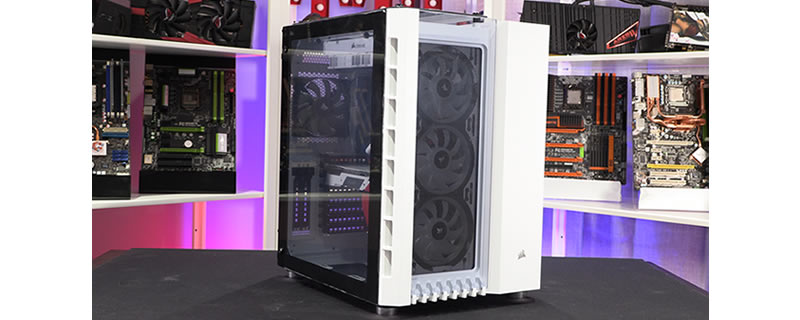Corsair Crystal 680X RGB Review
Conclusion Â
The Corsair Crystal 680X is an easy case to describe. In short, it is the bigger brother of the Crystal 280X, overcoming the shortcomings of MATX by scaling to a larger size and scale, supporting even EATX mainboards.Â
As a dual-chambered case design, the 680X offers users the ability to easily create a clean-looking PC within the main chamber, while hiding any cable clutter, storage drives and other unsightly components in the second chamber. Things could look extremely messy in the rear of this enclosure, but anyone looking from the outside would be none the wiser.Â
On the topic of price, there is no denying that the Crystal 680X RGB is expensive, shipping for £219.99 in the UK. That said, the chassis does ship with three LL120 series addressable RGB fans and a Corsair Lighting Node PRO lighting controller, a setup that costs £84.99 as a standalone product. After accounting for that, the value proposition of the 680X seems a lot more reasonable. That said, the case is still above the price ranges of many PC gamers.Â
Sadly, Corsair has no plans to sell a non-RGB version of this case. When we asked about it, we were told that Corsair’s RGB cases could outsell the non-RGB versions by as much as 10:1, giving Corsair little reason to sell a non-RGB variant. This is already a premium case design, so removing the RGB fans would do little to appease the budget PC crowd. Â
When it comes to water cooling, the Crystal 680X has options for 240/280mm radiators at the top and bottom of the main chamber and up to a 360mm radiator at the front of the enclosure, though it is worth noting that these radiators can clash depending on their thickness. Great care will need to be taken when adding water cooling to this case, especially when using multiple radiators. Thankfully Corsair has left more than enough space in the case’s secondary chamber for your water cooling pump and reservoir, keeping it out of sight while freeing up more space in the main chamber. Radiator placement options are described in more detail in our video review.Â
For those who do not plan on using this case’s floor fan mounts, a simple modding option would be to create a simple acrylic floor for the chassis. This mod will bring some more of the case’s smooth exterior inside the enclosure, while also offering users the opportunity to showcase some extra creative flair. This mod will clean up the inside of the chassis a little, and this idea should not be considered as a negative point against the 680X. Â
The 680X’s included RGB fans are controlled using Corsair’s Lighting Node PRO, which in turn is controlled using Corsair’s iCUE software. We have been told that Corsair’s iCUE SDK has made it to 3rd party manufacturers, a change which should allow 3rd parties to more easily control Corsair’s RGB products. We will create a full video on this topic when we hear more about this, and when any 3rd party RGB software becomes usable with Corsair’s iCUE components.Â
In all, there is very little to argue about when looking at the Corsair 680X, yes it is expensive, but after accounting for the case’s size and RGB features, we can see why it costs over £200. Another negative could be the case’s tempered glass front and top panels, which undoubtedly inhibit airflow from the fans behind it. That said, if you are buying this case, you are doing so for aesthetic reasons, and we don’t see how Corsair could address this issue given how fundamental tempered glass is to this case’s aesthetic.Â
On the topis of vertical GPU mounting, we will also re-iterate what we stated on page 2. We do not recommend using this case’s stock vertical GPU mount with graphics cards that are over two slots thick, as it would offer them very little breathing room. Users of ticker graphics cards may want to invest in 3rd party vertical GPU mounting solutions or stick with a standard, non vertical GPU mounts.
Petty niggles aside, the Corsair Crystal 680X is a solid offering, delivering plenty of space for most ATX and EATX systems. While much of the design is not revolutionary, there is little about this case that is worth complaining about. The case offers a clean and simple aesthetic while delivering enough scale to shoot past the compromises of the smaller 280X.Â
As for an award, we feel it is appropriate to give Corsair’s Crystal 680X RGB case with our official seal of approval. This case offers a host of modding possibilities for anyone with a creative spark, provides a clean aesthetic for those that desire a minimalist look and delivers users a lot more room to create a powerful workstation or gaming system.Â
You can join the discussion on our Corsair Crystal 680X RGB case review on the OC3D Forums.Â
Video



